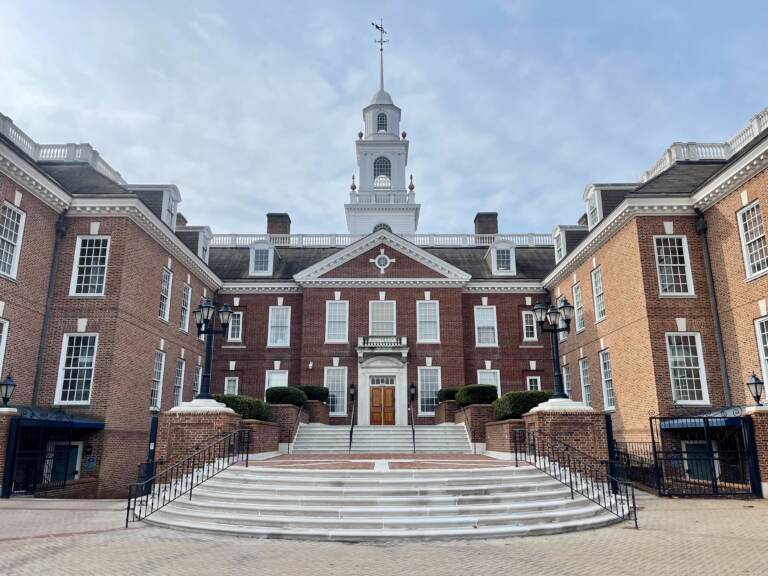Delaware Senate could soon vote on end-of-life legislation
A bill would allow terminally ill people with less than six months to live to request medication to end their lives.
Listen 0:56
Legislative Hall in Dover, Delaware. (Johnny Perez-Gonzalez/WHYY)
From Philly and the Pa. suburbs to South Jersey and Delaware, what would you like WHYY News to cover? Let us know!
This story was supported by a statehouse coverage grant from the Corporation for Public Broadcasting.
A Delaware Senate committee has approved legislation allowing medical aid in dying after terminally ill patients urged members to let it get a floor vote.
It’s the first time the state Senate has held a hearing on the Ron Silverio/Heather Block Delaware End of Life Options Act, named in honor of two advocates of the legislation.
“My father, he never feared dying,” said John Silverio, Ron’s son, who died of metastatic prostate cancer in 2018 without end-of-life options. “He feared dying in excruciating and unbridled pain.”
Sometimes known as “physician” or “medically assisted suicide,” the legislation would allow terminally ill people with less than six months to live to request and ingest medication to end their lives. Two doctors would be required to certify that the patient is mentally capable of making an informed decision and is acting voluntarily.
The lead sponsor, Rep. Paul Baumbach, has pushed the legislation since 2015. Other co-sponsors include all members of Democratic legislative leadership.
Baumbach said the bill includes a number of safeguards, including ensuring patients are self-administering the medication, moral objection opt-outs for medical providers, waiting periods and mandatory mental health evaluations.
It received a number of public comments during Wednesday’s hearing, both in support and opposition. Some religious and disability groups have expressed their opposition to the legislation.
Hockessin psychiatrist Neil Kaye, former president of the Psychiatric Society of Delaware, said he opposes the bill because he believes doctors should not be helping people die. Under questioning from Sen. Brian Pettyjohn, R-Georgetown, about a cluster of 11 youths from Kent and Sussex counties who took their lives in early 2012, Kaye said legalizing physician-assisted suicide could cause a “contagion” where more people try to kill themselves.
“We should not corrupt the medical profession by encouraging doctors to do this,” he said. “Nor should the legislature send a message to teenagers in our state that suicide in any way is acceptable and condoned.”
Wilmington resident Judy Govatos, a supporter, said she’s facing prolonged suffering before death brought on by cancer diagnoses.
“My family and friends have already been through hell and back with me,” she said. “I don’t want to go there again and I don’t want to take them with me.”
The House passed the bill in April, with a 21-16 vote. If it becomes law, Delaware would be the 11th state nationwide to enact an end-of-life provision, joining other states like New Jersey, Vermont and Oregon.

Get daily updates from WHYY News!
WHYY is your source for fact-based, in-depth journalism and information. As a nonprofit organization, we rely on financial support from readers like you. Please give today.







